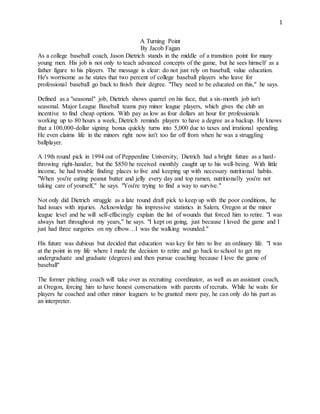
FaganJacob_TurningPoint
- 1. 1 A Turning Point By Jacob Fagan As a college baseball coach, Jason Dietrich stands in the middle of a transition point for many young men. His job is not only to teach advanced concepts of the game, but he sees himself as a father figure to his players. The message is clear: do not just rely on baseball, value education. He's worrisome as he states that two percent of college baseball players who leave for professional baseball go back to finish their degree. "They need to be educated on this," he says. Defined as a "seasonal" job, Dietrich shows quarrel on his face, that a six-month job isn't seasonal. Major League Baseball teams pay minor league players, which gives the club an incentive to find cheap options. With pay as low as four dollars an hour for professionals working up to 80 hours a week, Dietrich reminds players to have a degree as a backup. He knows that a 100,000-dollar signing bonus quickly turns into 5,000 due to taxes and irrational spending. He even claims life in the minors right now isn't too far off from when he was a struggling ballplayer. A 19th round pick in 1994 out of Pepperdine University, Dietrich had a bright future as a hard- throwing right-hander, but the $850 he received monthly caught up to his well-being. With little income, he had trouble finding places to live and keeping up with necessary nutritional habits. "When you're eating peanut butter and jelly every day and top ramen, nutritionally you're not taking care of yourself," he says. "You're trying to find a way to survive." Not only did Dietrich struggle as a late round draft pick to keep up with the poor conditions, he had issues with injuries. Acknowledge his impressive statistics in Salem, Oregon at the minor league level and he will self-effacingly explain the list of wounds that forced him to retire. "I was always hurt throughout my years," he says. "I kept on going, just because I loved the game and I just had three surgeries on my elbow…I was the walking wounded." His future was dubious but decided that education was key for him to live an ordinary life. "I was at the point in my life where I made the decision to retire and go back to school to get my undergraduate and graduate (degrees) and then pursue coaching because I love the game of baseball" The former pitching coach will take over as recruiting coordinator, as well as an assistant coach, at Oregon, forcing him to have honest conversations with parents of recruits. While he waits for players he coached and other minor leaguers to be granted more pay, he can only do his part as an interpreter.